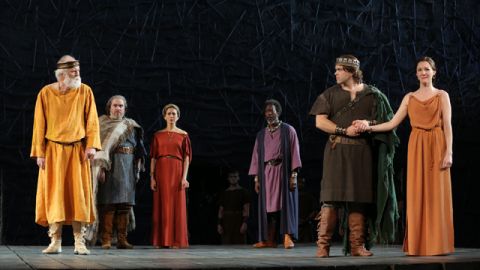BILL MOYERS:
Charles McGrath did a lovely piece about you a couple, three years ago, in "The New York Times." You were in rehearsal for "The Columnist" about our friend, Joe Alsop. And he said that for a man best known for playing oddballs and weirdoes, you know, a psychiatric, a psychotic physicist, on Buckaroo Banzai, that extraterrestrial professor on" 3rd Rock from the Sun" and the creepy serial killer in "Dexter." John Lithgow is disappointingly normal in person.
JOHN LITHGOW:
I chose to take that as a compliment.
BILL MOYERS:
Well, you would. But you have to become one of the most abnormal, tormented, vindictive figures in literature to move people as you do move people as Lear.
JOHN LITHGOW:
Well, I think as a person I'm kind of a cipher. I mean, I sort of channel things. That's what I do for a living. And I love to do it. I sort of reach down into myself and root around for the various characteristics of the people I play. But I'm a extravagant actor, I'm a character actor. When they need the big, bold sometimes grotesque gesture, they come to me.
BILL MOYERS:
Do you think that's why they came to you for Lear or-
JOHN LITHGOW:
No, I came to them for Lear.
BILL MOYERS:
Oh, how so?
JOHN LITHGOW:
Well, I was-- I've been in touch with Oskar for years about playing the part.
BILL MOYERS:
Oskar Eustis?
JOHN LITHGOW:
Yes. And Dan Sullivan, who's been doing these superb productions of Shakespeare, one per summer, for the last six or seven years. He's a good friend. He directed "The Columnist" also. And, he, you know, I approached Dan, we all somehow the idea just cohered for this summer.
BILL MOYERS:
But it's a frightening role to consider, isn't it? I mean, actors take years to work up to this role: Paul Scofield, Laurence Olivier, Charles Laughton. How did you decide that you were ready?
JOHN LITHGOW:
Well, it has taken me years. I, actually, I was asked to play it 20 years ago. I've been asked to play it a few times. And I did pass on that. I did have the sense to know that I was too young for it. I have to tell you I played Gloucester when I was 18 years old at college, who's just as old as King Lear and just as bad things happen to him.
BILL MOYERS:
Tell us about Gloucester in a word.
JOHN LITHGOW:
Gloucester is a sweet, incredulous man. It's a wonderful role. In our production it's played by Clarke Peters, extremely well known for "The Wire" and several other great things on television. He is easily duped by his bastard son Edmund into turning against his good son, his legitimate son Edgar.
He helps King Lear when King Lear has been when Goneril and Cornwall have turned on King Lear, Gloucester sneaks out to help him. And as a result of that gesture of goodwill and charities toward his beloved king, he's blinded, brutally blinded onstage. So he's-- it's a completely parallel story. We've talked about nothing but King Lear, but in fact King Lear is two plays in one. You know, it's two intersecting stories of fathers and their children: Gloucester with his two sons, Lear with his three daughters.
Lear is as you have described him, a very autocratic king. And Gloucester is a very dutiful subject and an innocent, something of an innocent, quite a beautiful role. He has some pretty great lines, too. He's the one who gets to say, "As flies to wanton boys, are we to the gods. They kill us for their sport." Everyone's got good lines in this play.

 Is 'King Lear' the Shakespeare Play for Our Times?
Is 'King Lear' the Shakespeare Play for Our Times?